Last Updated on October 13, 2024 by Mary Phagan
It took seventeen [17] years for Steve Oney to publish his book And the Dead Shall Rise, The Murder of Mary Phagan and the Lynching of Leo Frank, published by Pantheon, a division of Random House, October 7, 2003 with 742 pages which starts with the murder of Mary Phagan, a 13-year-old who worked at the National Pencil Factory and ends with the lynching of Leo Frank, superintendent of the factory by a group of vigilantes on August 17, 1915 from an oak tree outside Marietta near the present-day Big Chicken.
Oney is a University of Georgia graduate and then went to Harvard where he was as a Nieman Fellow. Oney worked for several years as a staff writer at The Atlanta Journal Constitution Magazine before he became a freelance writer for Esquire, The New York Times Magazine, Playboy, GQ, Premiere.
What makes this book different than the others that have been written?
- Considered to be the Anti -Defamation League [ADL] definitive account of the case without conclusion about Frank's innocence or guilt.
- NO PROOF AT ALL that “prejudice” or “anti-Semitism” affected the trial.
Claims by the ADL and former governor Roy Barnes, Rabbi Lebow, Jewish Community and others "And there were just mobs of people. And as the jury would go [to] the courthouse every day, the mob would scream, ‘Hang the Jew or we’ll hang you!’ didn't happen! This is very significant because this particular claim is central to the belief that anti-Semitism infected Frank’s murder trial and tainted the guilty verdict.
But Steve Oney is very, very clear about it:
“[I]t didn’t happen. It was something that someone wrote a couple years after the crime, and then it got stuck into subsequent recountings of the story….Jews were accepted in the city, and the record does not substantiate subsequent reports that the crowd outside the courtroom shouted at the jurors:
‘Hang the Jew or we’ll hang you.’”
3. It is the first published account of an accurate listing of vigilantes who planned and carried out the lynching of Frank. Oney spoke to numerous Mariettans [Bill Kinney, Associate Editor of Marietta Daily Journal, Judge Luther Hames, George Morris, Lucille Suhr, Lex Jolley, Narvel Lassiter, Bob Garrison, Jimmy T. Anderson, Eugene Herbert Clay, Chuck Clay, Mary Phagan-Kean.] *March 8, 2003 MDJ
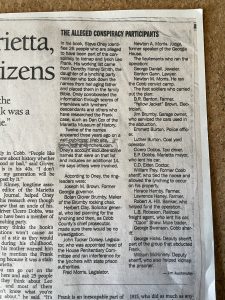
On Thursday, October 9, 2003, Oney was guest speaker at the Marietta Kiwanis Club meeting with approximately 250 people. Notable guests who had ties to the case included:
Georgia Department of Education Program Specialist for Visual Impairments, Mary Phagan-Kean, great-niece of Mary Phagan.
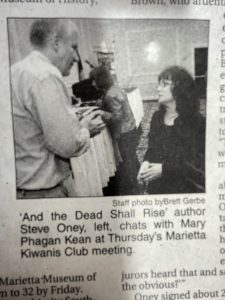
Associate Editor, Bill Kinney, uncle to Cicero Dobbs.
State Senator Chuck Clay, great-nephew of Herbert Clay alleged lynching planner.
Marietta Councilman Andy Morris, great-grandson of. alleged lynching planner Cobb Superior Court Judge Newt Morris.
Realtor James Bolan Glover, kin of alleged planner Bolan Glover Brumby.
Insurance Executive J.F. Shaw, son of alleged lyncher Coon Shaw.
Media Mogul, Tom Watson Brown, great-grandson of Tom Watson who published The Jeffersonian in which his editorials supposedly created the atmosphere to undertake the lynching after Governor Salton commuted Frank's death sentence.
Steve Oney Interview: James Edward Phagan, Sr. and Mary Phagan-Kean at the home of James Edward Phagan Sr. in 1980's before his book was published. [1714 Hudson Woods Trial, Decatur, Georgia]
Honestly, we were shocked at his depiction of the Phagan Family -Mary Phagan was a "hillbilly" "cracker" very, very flirtatious, developed for her age.
"Mary would have been one of the prettiest girls in any crowd. Eyes blue as cornflowers, checks high-boned and rosy, smile beguiling as honeysuckle, figure busty [later, everyone acknowledged that she was exceedingly well-developed for her age], she had undoubtedly already tortured many a boy. There was simply something about her -a tilt to the chin, a dare in the gaze-that projected those flirtatious wiles that Southern girls often employ to devastating effect.” *Steve Oney quotes Page 25 of the Pinkertons Files on May 13, 1913- those words are not stated. Mrs. Coleman states that "Mary had not reached puberty, but that the girl was large and well-formed, appearing to be at least sixteen years of age." *Page 3-4 of Oney's book
Mary had worked eleven-hour shifts, five days a week [barring holidays] during the time period from spring 1912 to April 26, 1913 at the National Pencil Company. The Atlanta Constitution reported that Mary resigned the Thursday, April 24, 1913, before her murder: Apil 28, 1913. "Mrs. Coleman reports stated that Mary began working at the age of 12 for the National Pencil Company and did not have to work after she married J.W. Coleman" [The Leo Frank Case, 1991 Special Edition, Leonard Dinnerstein page 11]. Nowhere in the record can it be found that Mary "quit school to help out at home. Or that in 1909, at the age of 10, she'd hired on part-time at a textile mill and in 1911, she'd taken a steady job at a paper manufacturer. [Actually, it was my grandmother, Mary Phagan: Interview March 5, 1987] *Page 5 Oney [Atlanta Georgian, April 28, 1913]- Steve Oney is promoting misinformation as my grandmother, Mary Phagan [Interview 1986] was the one hired at age 10 at a part-time at a textile mill and in 1911 had taken a steady job at a paper manufacturer.
1910 Census which indicates Mary was not working at age 11.
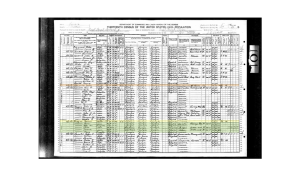
Family History see Chapter 2 pages 9-23 or repeat this?
William Jackson Phagan was born on November 17, 1854, in Hall, Georgia, his mother, Ruth, was 24. He married Angelena "Jelena" O'Shields on February 18, 1872, in Hall, Georgia.
William Jackson Phagan and Angelina O'Shields Phagan, made their home in Acworth, Georgia. Their land off Mars Mill Road was also home to their children: William Joshua, Haney McMellon, Charles Joseph, Reuben Egbert, John Marshall, George Nelson, Lizzie Mary Etta, John Harvell, Mattie Louise, Billie Arthur, and Dora Ruth. Two other children had died during childbirth. "These children grew up to be very close to one another. Their father, W.J., believed that that was what the family unit was meant to be: by depending on each other and furthering their education, he was sure, the Phagans would get far ahead in the world. "The eldest son, William Joshua, loved the land and farmed with his father. On December 27, 1891, he married Fannie Benton. The Reverend J.D. Fuller presided over the Holy Bans of Matrimony for them in Cobb County, Georgia. W.J. gave them a portion of the land and a home of their own, and Fannie and William Joshua farmed the land together. They, too, became successful farmers.
"Around 1895, W.J. moved the family to Florence, Alabama. William Joshua and Fannie, now with two young children, Benjamin Franklin and 0llie Mae, moved with them. "The family's new home, purchased from General Coffee, had been a hospital during the War Between the States. The house needed extensive renovation, but posed no financial burden on the family. W.J., Angelina, and their children lived in the main house; the young couple's new home was not far away. "The years in Alabama were good for them, especially for William Joshua and Fannie. They had two more children, Charles Bryan and William Joshua, Jr. They continued to farm the land. "In February of 1899, William Joshua Phagan died of measles. Fannie, who was then six months pregnant, was left with their four young children. She was devastated but kept her courage up: she knew the child she was carrying could be in danger.
On June 1, Mary Anne Phagan was born to Fannie in Florence, Alabama. "Fannie remained in Alabama long enough for her and her baby daughter to gain their strength. Then she moved her family back home to Georgia, where she planned to live with her widowed mother, Mrs. Nannie Benton, and her brother, Rell Benton."
W.J. Phagan moved his family back to Georgia as well. The death of his eldest son so bereaved him that the family could no longer remain in Alabama. He purchased a log home and land on Powder Springs Road in Marietta. W.J. also provided Fannie with a home for her and her five children to live in. He saw to it that they had no hardships. "About 1907 the last of the Phagan family left Alabama and returned to Georgia. Reuben Egbert and his family moved back to their native state and remained there for the rest of their lives. W.J. kept an eye on all his children and his grandchildren, and by 1910 had all of them nearby him, as well as financially secure, in Marietta.
Wedding announcement published 9 Aug 1911, in the Atlanta Constitution, for Laura Rogers and WJ Phagan:
1911 Wedding Announcement of William Jackson Phagan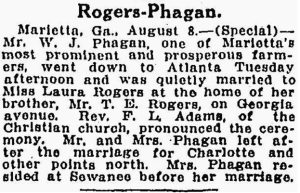
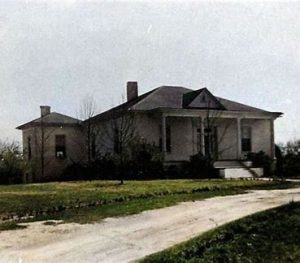
W.J. Phagan House in 1913, Marietta, Georgia.
Phillips-Phagan-Hunt Historic House
 Burned down on October 22, 2005.
Burned down on October 22, 2005.
W.J. Phagan died on November 20, 1914, in Marietta, Georgia, at the age of 60, and was buried in the prominent section of the Marietta City Cemetery where Mary Phagan is also buried.
The Family of Little Mary Phagan & The Truth About the Leo Frank Case is being censored to keep the public away from factual truthful information about Leo Frank. They are trying to blame the victim, Mary Phagan, and sully her reputation. They say, “Why would Mary go to the factory alone knowing of Frank’s reputation?”
The fact is Mary didn't see the notices posted at the Pencil Company on Friday that Saturday was a holiday, and the help would be paid off Friday evening. Mary Phagan, had been laid off the previous Monday, April 21, 1913, as a result of a shortage of brass sheet metal supplies. Not having been at the factory since the metal tips had run out, Mary had not seen the notice and reported at the usual hour on Saturday.
Certainly, Frank was a sexual pervert, but until then he had not shown himself to be violent and he had not been known to murder. Several other girls were also coming in that Saturday for their pay, and despite the holiday, many people had come to the factory for other business-related activities. Literally, just minutes before she arrived in Frank’s office two other female workers, a secretary, the office boy, a janitor, and the factory foreman had been there performing various tasks. Yet another woman was at the factory visiting her husband who was working on the above floor. So Mary could never have believed she was in danger. She planned to collect her pay and go on her way to see the Confederate Memorial Day parade.
- Preface: Final [Last Updated On: October 7th, 2024] [Originally Added On: October 16th, 2023]
- Chapter 15: 1995: The secret deceitful underhanded revisionist political Marker Change at Mary Phagan's Grave by the Parks and Tourism Committee, Marietta City Council and the Jewish Community. Final [Last Updated On: July 28th, 2024] [Originally Added On: October 16th, 2023]
- Chapter 13: 1987-1988 Mary Phagan NBC "Docudrama" Final [Last Updated On: July 28th, 2024] [Originally Added On: October 20th, 2023]
- Chapter 16: 1998: Parade the Broadway musical is a corruption of history and radical attempt to whitewash a horrible murder and pin it on Jim Conley, a Negro Final [Last Updated On: October 13th, 2024] [Originally Added On: November 5th, 2023]
- INTRODUCTION: FINAL [Last Updated On: April 3rd, 2024] [Originally Added On: December 18th, 2023]
- Chapter 18: Leo Frank Historical Marker Approved in 2006; Dedicated 2008 Final [Last Updated On: July 28th, 2024] [Originally Added On: January 4th, 2024]
- Chapter 19: PBS Documentary: The People vs Leo Frank: 2008; Seeking Justice The Leo Frank Case Revisited: 2009 Final [Last Updated On: July 28th, 2024] [Originally Added On: January 8th, 2024]
- Chapter 20: 100 years: 2013 Final [Last Updated On: July 28th, 2024] [Originally Added On: January 14th, 2024]
- Chapter 26: Phagan Family Position Paper 2021 Final [Last Updated On: July 28th, 2024] [Originally Added On: January 14th, 2024]
- Chapter 25: Jonathan Greenblatt: August 17, 2023, 2022, 2021 Final [Last Updated On: July 28th, 2024] [Originally Added On: January 14th, 2024]
- Chapter 21: 2015: 100 years after Leo Frank Lynching Final [Last Updated On: July 28th, 2024] [Originally Added On: January 15th, 2024]
- Chapter 22: 2019: Fulton County Conviction Integrity Unit [CIU] Established to Exonerate Leo Frank Final [Last Updated On: December 9th, 2024] [Originally Added On: January 21st, 2024]
- Chapter 28: January: 2024-2025 Fani Willis, Fulton County DA Investigated by Georgia Senate Commission Final [Last Updated On: April 12th, 2025] [Originally Added On: January 23rd, 2024]
- Chapter 27: Cobb Librarian Discusses the Lynching of Leo Frank: 2023 Final [Last Updated On: July 28th, 2024] [Originally Added On: January 23rd, 2024]
- Contents: Final [Last Updated On: August 13th, 2024] [Originally Added On: March 25th, 2024]
- Glossary: Final [Last Updated On: October 10th, 2024] [Originally Added On: March 25th, 2024]
- Appendix [Last Updated On: June 18th, 2024] [Originally Added On: March 25th, 2024]
- Dramatis Personae/Who's Who: Final [Last Updated On: October 10th, 2024] [Originally Added On: March 25th, 2024]
- Epilogue: Final [Last Updated On: December 17th, 2024] [Originally Added On: March 25th, 2024]
- Chapter 24: Roy Barnes Mercer Law School (November 12, 2019) Final [Last Updated On: July 28th, 2024] [Originally Added On: June 1st, 2024]
- Chapter 23: Fulton County Paul Howard defeated by Fani Willis; November 6, 2019 Final [Last Updated On: July 28th, 2024] [Originally Added On: June 1st, 2024]
- Chapter 29: Seeking Justice for Little Mary Phagan: Add Newsletters 2-14 Here Phagan Family Newsletter Collection [Last Updated On: April 12th, 2025] [Originally Added On: July 23rd, 2024]